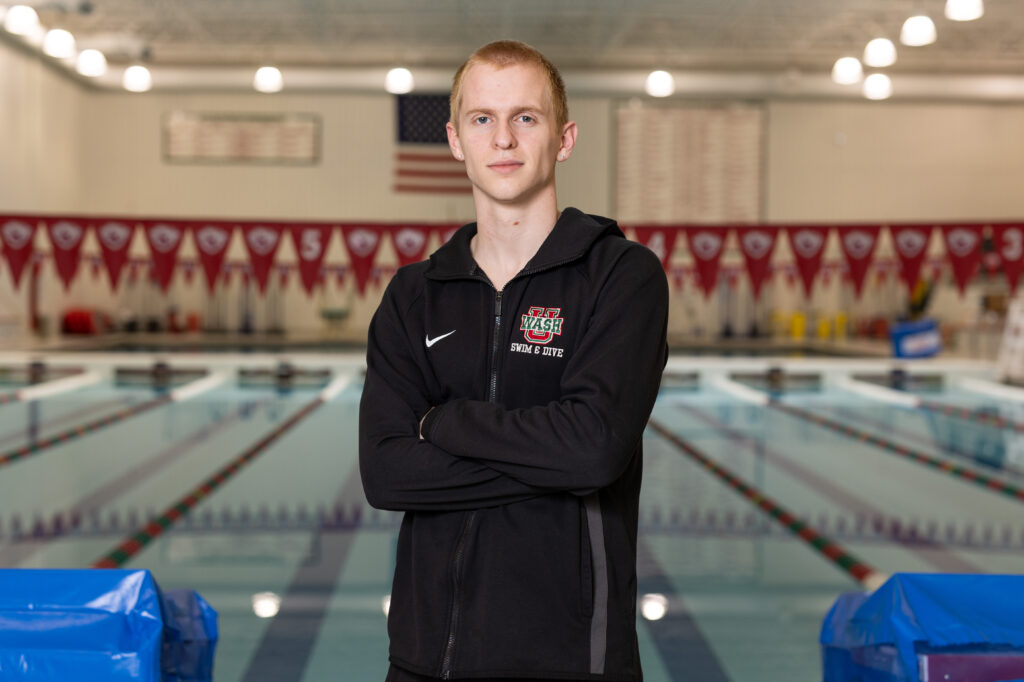When NCAA champion swimmer Kyle Wolford came to WashU, he was ready for the challenges that scholar-champions can face—the academic rigor, a demanding schedule and intense training sessions. But as a high-performing athlete, he didn’t expect his biggest challenge to be his own heart.
“I was diagnosed with myocarditis and pericarditis, basically inflammation of the heart muscles, which was pretty scary, especially for a guy who spends a lot of time with an elevated heartrate,” said Wolford.
The rare heart condition sidelined him from competition, casting uncertainty over everything from his athletic goals to his identity as an athlete. Though he was still very much included as a member of the swim team during his recovery, Wolford said that he felt like everything was slipping away from him in those moments.
“I would go to practice and support the team, but I wasn’t swimming, and it felt like my connection to the team was diminishing,” said Wolford. “That hurt because my teammates are more than that—they’re my friends, my roommates, my entire community of people.”
Then, when Wolford was cleared to get back into the pool, he said he disappointed himself.
Getting back into it was really tough and I was nowhere near where I expected myself to be. I struggled a lot, but I didn’t think it was fair to hold myself to an unhealthy standard. That’s when I knew I needed help getting my mind back to where it needed to be.
“Getting back into it was really tough and I was nowhere near where I expected myself to be,” he said. “I struggled a lot, but I didn’t think it was fair to hold myself to an unhealthy standard. That’s when I knew I needed help getting my mind back to where it needed to be.”
So, Wolford started working with a sports psychologist through the Division of Student Affairs to address what he was going through.
“I didn’t want to look back and have any regrets. So, I made a conscientious effort to unturn every resource available to me to recover from my setbacks,” said Wolford. “It was impressive how everything that my sports psychologist and I discussed felt immediately applicable. I became more confident, more resilient and more accepting of things, with the ability to bounce back and move on from perceived failure. I think that self-awareness and resiliency are the most profound personal insights I’ve gained while at WashU.”
Supported by Student Affairs’ Center for Counseling and Psychological Services (CCPS) as part of the division’s Healthy Excellence initiative, sports psychology services continue to see a steady increase in utilization by WashU scholar-champions, according to Dr. Luke Evans, staff psychologist.
“At its most fundamental level, sports psychology focuses on performance enhancement or discussing psychological skills that help athletes improve their performance,” said Evans. “Some of the most frequent concerns we see are perfectionism, self-criticism, low confidence, disordered eating and anxiety. We also often help scholar-champions recover from injury, which can be a very challenging time both physiologically and psychologically.”
Wolford said he put into practice many of the things he and his psychologist discussed like developing a winning mindset, reframing challenges, managing nerves and staying composed when facing stressful and high stakes competition.
“Swimming is just as much physical as it is mental,” said Wolford. “It’s really about your brain and getting your brain to move your body. If you’re not mentally where you need to be, you really have no shot for success.”
Wolford shared that with help from his therapist, he recalibrated. He reset and reapproached what it meant to be a competitive swimmer. Then, in his final year of competition, he won the national title in the 200-yard backstroke with a time of 1:44.15.
Understanding what held me back mentally and changing my behaviors around that helped me reach peak performance. While this is something I’ve applied to swimming, I know I can carry this with me to overcome life’s broader challenges with stronger self-awareness and an ability to accept and move beyond obstacles.
“Understanding what held me back mentally and changing my behaviors around that helped me reach peak performance,” he said. “While this is something I’ve applied to swimming, I know I can carry this with me to overcome life’s broader challenges with stronger self-awareness and an ability to accept and move beyond obstacles.”
Wolford is a member of the WashU Class of 2025 and graduated with both a bachelor’s and master’s degree in computer science.
These expanded mental health services offered through the Division of Students Affairs are made possible by charitable contributions from John and Carol Hamilton, the Justin Hardy Courage Fund and Brian Sullivan and Deirdre DeLany. These gifts were part of WashU’s “Make Way: Our Student Initiative,” supporting the university’s efforts to provide a best-in-class student experience.
Student Affairs’ CCPS provides all WashU students with a variety of services beyond sports psychology including short-term counseling, consultation, and outreach and prevention programs.
Healthy Excellence is one of the Division of Student Affairs’ five anchors that deliver a transformative student experience. Student Affairs aspires to distinguish WashU as a place where students graduate even healthier than when they arrive.
